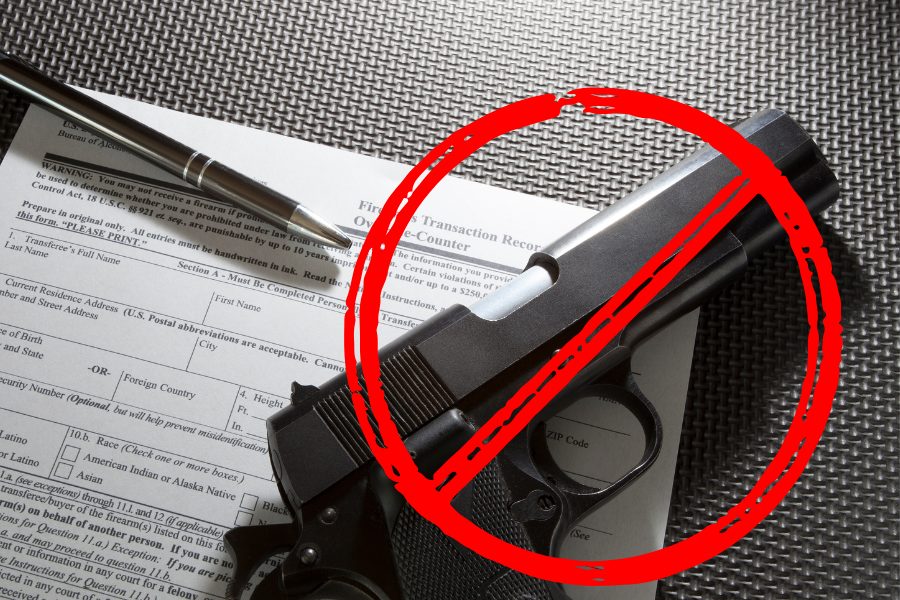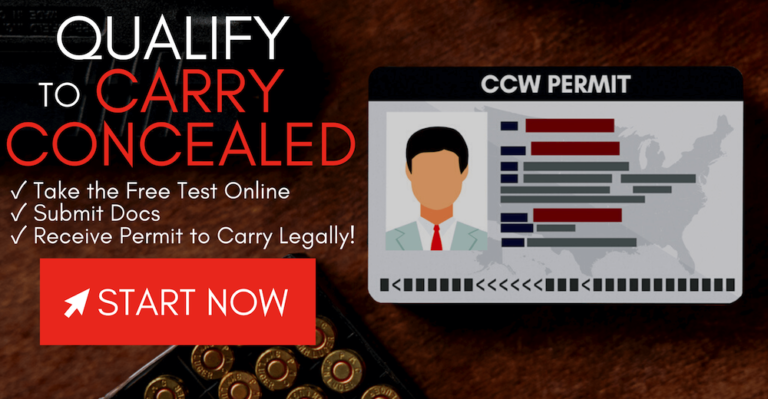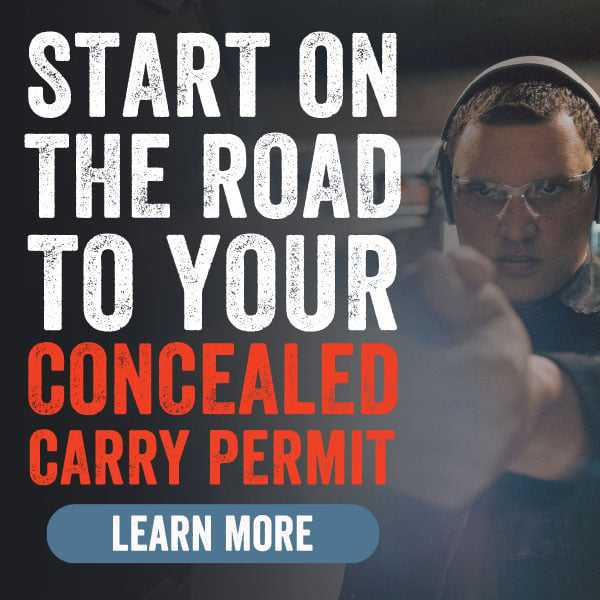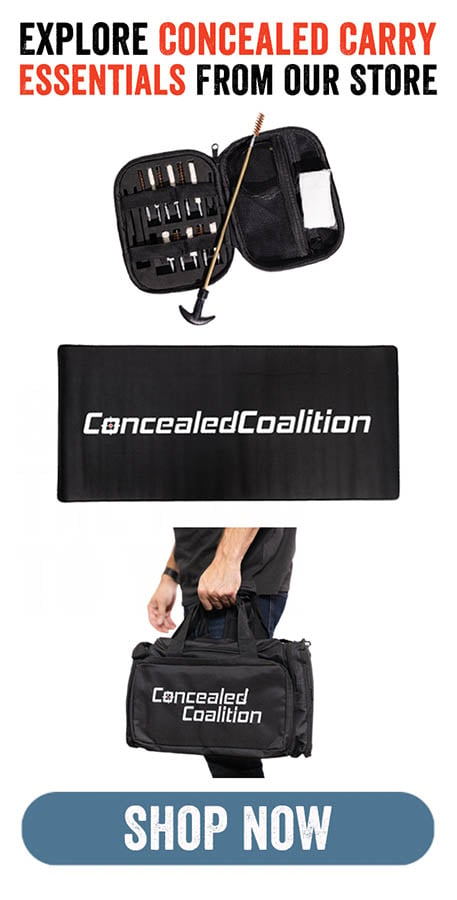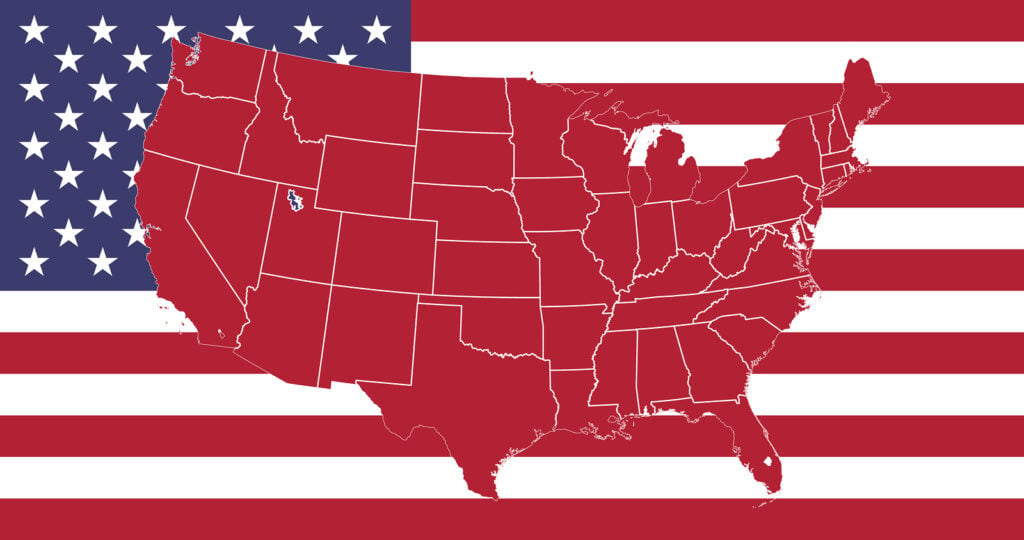If you’re asking “Where can I find a list of places where concealed carry is prohibited?”, the answer is: federal law prohibits carrying firearms in certain locations nationwide, while each state enforces its own additional bans.
To know the full list for your state, the most reliable resource is Concealed Coalition’s Reciprocity Map, which provides an up-to-date breakdown of restricted areas so you can stay legal wherever you go.
Understanding these restrictions isn’t optional — it’s essential. Even accidental violations can lead to criminal charges, fines, or the loss of your concealed carry permit. In this article, we’ll explore some of the common prohibited areas and how to navigate them legally.
The Importance of Using a State-Specific List
Concealed carry laws vary widely across jurisdictions. While federal regulations apply universally, individual states—and sometimes even cities—enforce their own rules about where firearms are permitted. What’s legal in one state may be completely prohibited in another.
For Example:
A state park in one jurisdiction might welcome firearms, while in another, they’re strictly forbidden. Similarly, some states allow concealed carry in establishments serving alcohol, while others impose an outright ban.
To stay compliant and informed, it’s essential to consult an updated, state-specific resource. That’s where the Concealed Coalition Reciprocity Map comes in. It’s designed to provide accurate, up-to-date information tailored to your specific location.
Federal Prohibited Locations (Nationwide Restrictions)
Federal laws are the baseline: they apply no matter what state you’re in.
| Restricted Location | Details |
| Federal Buildings & Facilities | Courthouses, post offices, IRS offices, Social Security offices, federal prisons, and any property under direct federal control (18 U.S.C. § 930). |
| Military Installations | Entry with a firearm is prohibited unless specifically authorized. |
| VA Hospitals & Clinics | Includes all Department of Veterans Affairs healthcare facilities. |
| School Zones | Under the Gun-Free School Zones Act (18 U.S.C. § 922(q)), firearms are banned within 1,000 feet of K–12 school property, unless specific exemptions apply. |
| Secure Areas of Airports | Includes TSA checkpoints and restricted access zones. |
| National Monuments & Certain Federal Lands | Rules vary, but many prohibit firearms entirely. |
Common State & Local Firearm Prohibited Locations
Firearm laws vary, but certain locations are commonly off-limits for concealed carry. Below is an overview of the most frequent categories where states and municipalities restrict firearms. Understanding these rules is crucial to ensure compliance and avoid legal consequences.
Government Buildings
Government facilities like state capitols, courthouses, DMVs, and city halls often prohibit firearms. In some states, all government-owned buildings are entirely off-limits, regardless of the circumstances. These restrictions aim to maintain public safety in areas where government services are conducted.
While laws differ by state—ranging from blanket bans to exceptions for law enforcement or authorized personnel—it’s essential to verify local regulations before entering government buildings with a firearm.
Law Enforcement & Correctional Facilities
Firearms are almost always prohibited in police stations, sheriff’s offices, prisons, and detention centers. Carrying a weapon in these high-security areas can lead to severe legal penalties, often classified as felony offenses. These rules are in place to ensure the safety of personnel and detainees.
Even concealed carry permit holders are rarely exempt from these prohibitions. It is critical to respect these restrictions and avoid carrying weapons in or around such facilities to prevent significant legal repercussions.
Schools & Childcare Centers
Most educational institutions, including K–12 schools, universities, preschools, and daycare centers, forbid firearms. While some states offer limited exceptions for concealed carry permit holders, many enforce strict bans to prioritize the safety of children and students.
Before entering an educational facility with a firearm, verify the regulations in your state or area. Violating these rules could lead to serious consequences, even if you hold a permit in states with stricter policies.
Healthcare Facilities
Hospitals, urgent care centers, and mental health institutions frequently restrict firearms. Some states allow carrying in private doctors’ offices, while others enforce blanket bans in all healthcare settings. These regulations are designed to protect the safety of staff and patients.
If you need to visit a healthcare facility, always research state and local laws beforehand. Penalties for violations can be severe, even for concealed carry permit holders.
Venues Serving Alcohol
Bars, nightclubs, and restaurants that serve alcohol often restrict firearms. Some states permit concealed carry as long as the individual is not consuming alcohol, while others strictly forbid firearms in these establishments.
Since alcohol-related venues can heighten risks, these restrictions are implemented to reduce potential conflicts. Always check state and local laws before carrying in places that serve alcohol.
Places of Worship
Churches, mosques, temples, synagogues, and other places of worship often have varying rules regarding firearms. While some states allow these institutions to establish their own policies, others impose statewide bans.
Before attending a service with a firearm, consult the specific place of worship or local regulations. Respect their policies, which are often designed to ensure the comfort and safety of the congregation.
Polling Places
Firearms are frequently restricted at polling locations during elections to maintain a neutral and secure environment for voters. These bans apply during active voting and vary by state.
To avoid legal penalties, confirm the rules governing polling places in your area before carrying a firearm to a voting location. These restrictions help prevent intimidation or disruptions during the electoral process.
Public Gatherings & Events
Large gatherings such as parades, festivals, demonstrations, and sporting events often prohibit firearms. Local ordinances or special permits regulating these events typically include restrictions on weapons to ensure the safety of attendees.
Before attending any public event with a firearm, verify the specific rules. Violating these restrictions can lead to fines or other legal consequences, depending on the type of gathering and local regulations.
Private Property with Posted Prohibitions
Many states enforce “No Firearms” signs on private property. If a business or property owner posts a prohibition, it is typically legally binding. Carrying a firearm in such areas can result in being asked to leave or facing legal action.
Respect property owners’ rights by adhering to posted signs. Ignoring these restrictions could lead to legal penalties or other repercussions depending on state laws.
Public Transit
Carrying firearms on public transportation, such as buses, trains, and subways, is often restricted in many states. These rules are in place to reduce risks in crowded spaces and maintain passenger safety.
Before traveling via public transit, familiarize yourself with the relevant local laws. Violating these restrictions can result in fines or legal consequences, even for concealed carry permit holders.
By understanding these common firearm restrictions, you can navigate concealed carry laws responsibly and avoid unnecessary legal complications. Always stay informed and comply with state and local regulations to ensure both your safety and that of others.
The Role of “No Firearms” Signs
In several states, a posted “No Firearms” sign carries the force of law, meaning that disregarding it can result in criminal trespass charges, even for individuals with a valid concealed carry permit. It’s essential for firearm owners to understand and respect these regulations to avoid legal consequences and ensure responsible behavior.
To stay compliant, always check entrances for signage indicating firearm restrictions. If you’re unsure, consult the property owner or manager for clarification. Should you be asked to leave a premises, do so promptly to avoid any issues.
Why the Concealed Coalition Reciprocity Map Is Your Go-To Resource
Relying on outdated legal lists from random websites can be risky. State laws change often, and enforcement rules can be hard to decipher. That’s why responsible carriers trust the Concealed Coalition Reciprocity Map. Here’s what makes it indispensable:
- Up-to-Date – Continuously updated to reflect the latest state and federal law changes.
- State-Specific Insights – Clearly outlines where you can and cannot carry.
- Travel-Friendly Tool – Ideal for planning interstate trips with confidence.
- Permit Reciprocity Simplified – Instantly see where your permit is valid and under what conditions.
Stay informed, travel smart, and carry responsibly with the Concealed Coalition Reciprocity Map.
Traveling with a Concealed Firearm
When crossing state lines with a concealed firearm, it’s crucial to remember that your home state’s firearm laws may not apply.
Start by checking reciprocity agreements to determine if your concealed carry permit is recognized in your destination state. The Concealed Coalition Reciprocity Map is a dependable resource for this information. Additionally, familiarize yourself with any state-specific regulations regarding restricted locations, as these rules can differ even in states with reciprocity agreements.
For states that do not honor your permit, ensure your firearm is transported legally and safely. Federal law requires firearms to be unloaded and securely stored in a locked container during travel. Following these guidelines is essential to avoid legal complications.
Legal Penalties for Carrying in Prohibited Locations
Carrying a weapon in a prohibited location can lead to serious legal consequences, which vary depending on the jurisdiction and the nature of the offense.
Penalties often include fines ranging from $100 to several thousand dollars, based on the severity of the violation. In some instances, offenders may face misdemeanor or felony charges, as defined by state or regional laws.
More severe infractions can result in the revocation of carry permits, stripping individuals of their legal right to carry a weapon. Additionally, certain violations may lead to jail or prison sentences, underscoring the importance of adhering to all applicable regulations.
Staying informed and compliant with these laws is essential to avoid these significant repercussions.
Essential Tips for Staying Compliant with Carry Permit Laws
To ensure compliance with carry permit laws, keep these key tips in mind:
- Stay Informed – Laws can change frequently. Make it a habit to review them regularly.
- Understand Restrictions – If you’re unsure whether carrying is allowed in a certain location, err on the side of caution and don’t carry there.
- Invest in Proper Training – Beyond shooting skills, learn about your legal responsibilities as a permit holder.
- Always Carry Your Permit – Ensure you have a copy of your permit with you at all times as proof of compliance.
- Know Reciprocity Agreements – Familiarize yourself with which states honor your permit when traveling across state lines.
- Maintain Your Firearm – Regularly inspect your firearm to ensure it is in safe and reliable working condition.
- Be Discreet – Practice careful handling and storage of your firearm to avoid unnecessary attention or concerns.
By following these guidelines, you can carry responsibly and confidently while remaining compliant with the law.
The Concealed Coalition Training Advantage
Understanding the law is just one aspect of being a responsible carrier. Proper training is essential to ensure you can operate safely, legally, and effectively in real-world situations.
Our state-approved curriculum meets all legal requirements and is designed to provide comprehensive education tailored to your needs. With expert instructors, including law enforcement and firearms professionals, you’ll gain valuable insights and hands-on guidance.
We offer flexible learning options, including online and in-person classes available nationwide; the type of class you can take (online or in-person) will depend on your state requirements. Beyond the basics, our training covers situational awareness, conflict avoidance, and defensive shooting techniques to fully prepare you.
Common Questions Answered
Where can I find a full list of places where concealed carry is prohibited?
You can find an up-to-date list on Concealed Coalition’s Reciprocity Map, which combines federal, state, and local restrictions. This ensures you know every location where carrying is banned in your area or while traveling.
What are the federal prohibited locations for concealed carry?
Federal law bans carrying in courthouses, federal buildings, secure airport areas, VA facilities, and within 1,000 feet of K–12 schools, among other locations. These rules apply nationwide.
Do state laws add more concealed carry restrictions?
Yes. States can add restrictions on top of federal law, such as banning firearms in hospitals, polling places, sporting events, or government buildings. Always check your state’s current list before carrying.
Are “No Firearms” signs legally binding?
In many states, posted “No Firearms” signs carry the force of law. Violating them can lead to trespassing charges, fines, or permit revocation. The rules vary by state, so check local laws.
Can I carry my firearm in a restaurant that serves alcohol?
It depends on your state. Some allow concealed carry if you are not drinking alcohol, while others prohibit it completely. Always confirm the law in your state before carrying.
How can I avoid accidentally carrying in a prohibited area?
Use tools like the Concealed Coalition Reciprocity Map, read posted signs, and research state-specific rules before traveling. When in doubt, leave your firearm secured in your vehicle.
What happens if I carry in a prohibited location?
Penalties can include fines, misdemeanor or felony charges, permit suspension or revocation, and even jail time. The severity depends on the location and state law.
Does my concealed carry permit work in every state?
No. Reciprocity agreements determine where your permit is valid. Even in states that honor your permit, prohibited locations still apply. Always check both reciprocity and location restrictions.
Final Word
The bottom line: Federal law prohibits concealed carry in certain locations nationwide, and state/local laws add more restrictions that vary greatly.
The safest, most reliable way to find the full list for your area is to check Concealed Coalition’s Reciprocity Map before you carry — and to keep your training up to date with expert instruction.
Carrying a firearm is a serious responsibility. With the right knowledge and training, you can stay compliant, protect your rights, and be prepared when it matters most.
